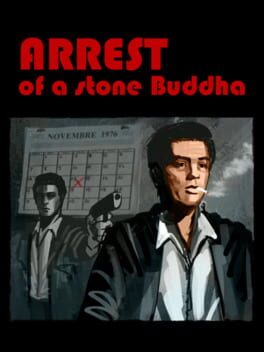Arrest of a Stone Buddha is about depression. It tells the story of an emotionless man who goes through his life in a state of numbness. He finds joy only in killing people, justified by the will of the organization that commands him.
What elevates the narrative is that it’s told almost entirely through the player’s mechanical interaction with the world. Arrest of Stone Buddha is separated into two parts: highly entertaining shootout sequences and the simulation of an empty daily life. Between every mission, you’re forced to wander around a small, colorless town engaging in activities utterly devoid of meaning. You watch a movie, you visit an art gallery, you spend time with a lover, you stay at home lying on your bed staring at the ceiling… All of these share the same purpose. You're waiting for the day to end. It's a loop that perfectly translates the main character's situation and lifestyle to the player's experience. With each passing cycle, this connection grows stronger, the game becomes more and more boring. Even the music gets irritating. By the third level, you'll most likely have done everything there is to do in the town, and at that point you'll find yourself constantly checking the time, eagerly anticipating the moment you're allowed to sleep. You're going through the motions, at least until it's time to kill people again.
Combat is the only fun part of this game.
It's always the same core loop for every level with little to no variation, but it's a solid, engaging core that never stops being entertaining. And that's all that action is for the main character, too. The part of his life that's still engaging, that makes him feel something.
Violence is the only meaningful interaction he has with other human beings, even dialogue is kept to a minimum and exists only to reinforce what ideas were already solidified by the gameplay. People serve the purpose of objects. His lover provides pleasure, the pharmacist provides sleep medication, his friend provides missions and the men he kills provide entertainment. He doesn't care about Lanky, he doesn't care about politics, he doesn't care about real life. All he cares about is his next assignment. People, to him, are like NPCs, which further his disconnection from reality and connection to the player. He sees the world through a narrow, detached point of view and interacts with it as a player interacts with systems.
In a sense, the main character lost his humanity. He has become an emotionless machine of hedonism. His choice in the end, the only one that matters, is whether to accept his death (now physically) or let a last sign of humanity slip through by giving up and crying.
What elevates the narrative is that it’s told almost entirely through the player’s mechanical interaction with the world. Arrest of Stone Buddha is separated into two parts: highly entertaining shootout sequences and the simulation of an empty daily life. Between every mission, you’re forced to wander around a small, colorless town engaging in activities utterly devoid of meaning. You watch a movie, you visit an art gallery, you spend time with a lover, you stay at home lying on your bed staring at the ceiling… All of these share the same purpose. You're waiting for the day to end. It's a loop that perfectly translates the main character's situation and lifestyle to the player's experience. With each passing cycle, this connection grows stronger, the game becomes more and more boring. Even the music gets irritating. By the third level, you'll most likely have done everything there is to do in the town, and at that point you'll find yourself constantly checking the time, eagerly anticipating the moment you're allowed to sleep. You're going through the motions, at least until it's time to kill people again.
Combat is the only fun part of this game.
It's always the same core loop for every level with little to no variation, but it's a solid, engaging core that never stops being entertaining. And that's all that action is for the main character, too. The part of his life that's still engaging, that makes him feel something.
Violence is the only meaningful interaction he has with other human beings, even dialogue is kept to a minimum and exists only to reinforce what ideas were already solidified by the gameplay. People serve the purpose of objects. His lover provides pleasure, the pharmacist provides sleep medication, his friend provides missions and the men he kills provide entertainment. He doesn't care about Lanky, he doesn't care about politics, he doesn't care about real life. All he cares about is his next assignment. People, to him, are like NPCs, which further his disconnection from reality and connection to the player. He sees the world through a narrow, detached point of view and interacts with it as a player interacts with systems.
In a sense, the main character lost his humanity. He has become an emotionless machine of hedonism. His choice in the end, the only one that matters, is whether to accept his death (now physically) or let a last sign of humanity slip through by giving up and crying.
